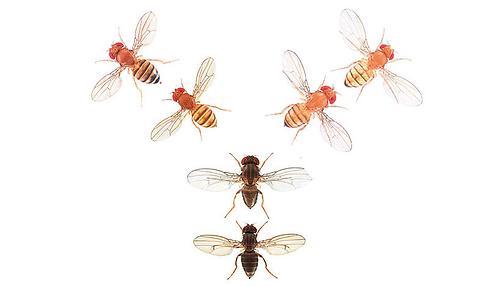The "selfish" sex chromosome#
The Y chromosome is known to determine the male sex. What is less well known: usually 90 percent of the Y chromosome consists of junk DNA that outcompetes functional elements. In his ERC project, biologist Qi Zhou investigates how it survived natural selection and what impact it may have on the genome.#
"The XY chromosomes mark the major genetic differences between male and female", explains Qi Zhou. "In mammals, the Y chromosome determines the male sex." The biologist has been studying sex chromosomes his entire career, but there are still many puzzling questions that modern research cannot provide answers for – at least not yet.
Studying fruit flies#
In order to gain further insight into how the sex chromosomes work and how they evolved, Zhou examines Drosophila, better known as fruit flies. Drosophila and humans share the XY system, even though the Drosophila's Y chromosome is much younger. "Our human Y chromosome is about 180 million years old. The system that I work with – Drosophila Miranda – is only one million years old, so I still find traces to study", explains the ERC grantee from the University of Vienna.
Human Genome Project#
If we are to understand what makes the Y chromosome so special, we have to go back to the 1990s: An international board of over 50 scientists from all over the world collaborated on the Human Genome Project. The aim of the project was to determine the sequence of nucleotide base pairs that form the human DNA. "In the biological world it can be easily compared to Apollo 13", smiles Zhou. Back then, the researchers found many so-called repetitive elements in addition to the functional genes. "These elements do not encode any genes. Even worse: they outcompete other functional elements sometimes by a faster propagation rate in the genome", says Zhou.
What remains is junk DNA#
It turned out that especially the Y chromosome is full of these repetitive elements. This repetitive content can reach up to 90 percent. "The chromosome that determines our sex is basically a garbage can for repetitive DNA", states Zhou. The junk elements have been studied a lot, for instance, in Richard Dawkins’ book "The selfish gene". However, it is still not clear why these "selfish" junk elements on the sex chromosome exist nor how they are regulated and if they have an impact on the rest of the genome.
"Anything that exists today may have – more or less – undergone natural selection", explains Zhou. However, the young biologist explains a hypothesis on how the repetitive elements survived: "Each pair of chromosomes can exchange their genetic material. The consequence of this recombination is to effectively remove bad mutations. For the XY chromosomes, recombination is shut down since the male-determining gene should not be recombined onto the X chromosome — then the female will carry the male-determining gene. Once this is done, the Y chromosome starts to accumulate its deleterious mutations – what we now identify as apparent junk."
Modern technology of genetics#
In his research, Zhou uses gene sequencing. Cutting-edge machines – as provided by the Vienna Biocenter – can read up to 50,000 base pairs per run, enabling Zhou and his colleagues to obtain much more complete information on the genomes in a short time. He also sequences the small RNA – a defence mechanism against junk elements – to find out how the Y chromosome is regulated. Last but not least, he is also going to use the editing tool CRISPR-Cas9: "We want to remove the guardians of these junk DNAs from the evolving Y chromosome. If we can observe changes, it would mean that junk DNA affects the rest of the genome as well. This would be a groundbreaking discovery, since we mostly think of the Y chromosome as only a male determinant."
From China to Austria#
"Right now we are getting the entire sequence of the Y chromosome. After that we will start to collect the small RNA", explains Zhou, who came to the Department of Molecular Evolution and Development just one year ago. "The ERC Grant opened a gate for me to do research in Europe", says the 36-year-old grantee. What he appreciates most at the University of Vienna is the intelligent environment and the strong support for basic research: "My research is completely curiosity-driven. For example, I will never be able to develop a drug to treat cancer, but applied research and basic research have been benefiting each other all the time."
Problems to solve#
Zhou still holds a position at Zhejiang University in China and travels back and forth often. When he is not busy working, he enjoys the art scene and cultural life of Vienna, goes hiking or drinks coffee in the seventh district, where he lives. "When I am old, I can imagine being one of the elderly people reading newspapers in a Viennese coffee shop all day long", smiles Zhou. "But not now." The young biologist still has some problems to solve. (hm)
Qi Zhou, PhD, is a member of the Faculty of Life Sciences of the University of Vienna. His project "Evolution and Impact of Heterochromatin on a Young Drosophila Y chromosome" is funded by the European Research Council (ERC) and runs from August 2016 to August 2021.
ERC Grants at the University of Vienna#
The funding of pioneering basic research is one of the priorities of the European Union. To this end, the European Research Council (ERC) has been established. Research projects must have a high potential for innovation to receive financial support. Since 2007, 41 ERC Grants have been conferred on researchers of the University of Vienna: 14 Advanced Grants, 5 Consolidator Grants, 21 Starting Grants and one Proof of Concept.

